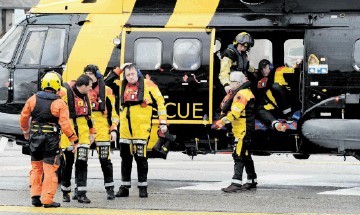
The Bond helicopter which ditched in the North Sea last week had an engine failure on its way back from an oil field less than a month ago, the Press and Journal can reveal.
The EC225 Super Puma G-REDW was returning from a routine crew change at BP’s Harding Field on April 19 when one of its two Makila 2A1 engines “malfunctioned”.
An offshore worker said the aircraft felt like it was “dropping out of the sky”.
He said there was a period of six seconds when he felt the chopper was “falling through the air” before its back-up engine activated and allowed it to make a normal landing at Aberdeen Airport.
Bond spokesman Stephen Ballard said at the time the claims were “exaggerated” – but admitted one of the engines in the aircraft had failed.
And last night he said the two incidents were an “unfortunate coincidence” not within Bond’s control.
The engine was removed from the £17.6million Super Puma and sent away for inspection, but the helicopter continued flying with a new engine.
Shortly after the incident, Mr Ballard said: “The helicopter is still flying because the faulty engine has been taken out and sent back to the manufacturers for a complete strip down.
“It is now running with a different engine. We have not made any other checks with regards to this incident on any of the other aircraft because we believe it is a one-off.”
Last night, Jake Molloy, regional organiser for the RMT union, said he had put a number of concerns to Bond which had been denied or answered.
He said: “I had heard about the incident on April 19 and have asked Bond to confirm what happened, but at the moment they won’t say anything. It is difficult for me to comment any more than that as I want to give them the opportunity to respond.
“I have boys concerned about flying with Bond right now and they really need to do everything they can to reassure everyone.”
On Thursday a rescue operation was launched when Super Puma G-REDW made an emergency landing in the North Sea after an oil pressure warning light came on.
The three-year-old EC225 aircraft carrying two crew and 12 offshore workers came down 25 miles east of Aberdeen.
The men were all rescued and the pilots have been hailed as heroes for managing to complete a tricky sea landing and save the lives of all on board.
It was the third serious incident involving a Bond Super Puma in the North Sea in the last three years.
All the operator’s EC225 choppers have been grounded until further notice. The helicopter was brought ashore on Friday by the diving support vessel Seven Pelican. It was then taken by road to Farnborough in Hampshire where the Air Accident Investigation Branch have started a detailed “root cause” probe.
Experts from manufacturer Eurocopter are also involved in the inquiry.
The AAIB said last night it was unable to comment on the incident as the investigation was ongoing. As well as offshore flights, Bond provides air ambulance helicopters, police and marine support to offshore windfarms and lighthouses and search and rescue and energy support services in the North Sea.
In February 2009, 16 passengers and two pilots survived when a Bond Super Puma EC225 crashed into the sea 125 miles from Aberdeen. Two months later, two pilots and 14 oil workers died after a “catastrophic” gearbox failure on Bond flight 85N which plunged into the sea 14 miles off Peterhead.